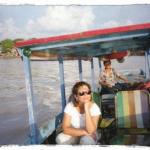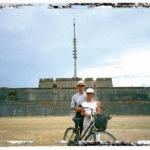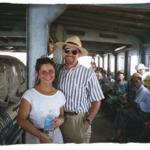Honeymooning in Vietnam
According to scholarly journals such as Brides, Modern Bride and Cosmo, a honeymoon should be filled with irrepressible desire and romance. Tenderness should be combined with wild experimentation and adventure. Ideally, newlyweds should venture to faraway places where they can test the conventional wisdom that says the couple that travels well together is destined for a long and successful marriage. This may be hard to achieve if the honeymoon is limited to just a few days or a long weekend. If you have several months for honeymoon travel, as my wife and I did, you can push your young marriage right to the limit.
When first discussing our honeymoon plans, we considered all the standards: Hawaii, Mexico, Europe, the Poconos. I thought Paris would be perfect, but Nina disagreed. "I want to go some place that's changing," she said. "Some place that won't be the same in another five years. Some place that's not overrun with Americans."
Immediately we thought of South Africa and Vietnam. When I was hired to do a management consultancy in Thailand, South Africa fell out of the running. Besides, we had heard that Vietnam had many charming touches left by the French, that certain parts would remind us of Paris, and that while a dollar would get us only four or five francs in France, in Vietnam we'd receive nearly 11,000 dong. Though we had no idea what a dong would buy, we decided to look for the romance of Paris in the tree-lined streets of Hanoi and Saigon.
Hearing that, after seventy-five years of combined bachelorhood, Nina and I were to be married, our friends and families were as happy for us as we were for each other. Until we told them where we were going for our honeymoon.
"Are you sure you want to go there?" they all asked.
We explained that Vietnam seemed to have all the exotic features we wanted in a honeymoon destination. We told them about the reading we had done, the lectures we had attended and the films we had seen to prepare ourselves.
They listened patiently to our enthusiastic and lengthy explanations. Then they asked again, "Yes, but why would you want to go there?"
A few weeks later, as I trudged up the curved staircase of the mildewed Dong Khoi Hotel in central Saigon, I was wondering the same thing. We had taxied all over town trying to find a vacancy in a reasonably priced hotel. We were flush from the heat. My fingers were blue from counting the very newly printed Vietnamese money we had received at the airport in exchange for our immaculate travelers' checks. What we needed was air-conditioning and a bath. Our guidebook said something about the Dong Khoi possessing the weathered grace of a bygone era. That sounded like a euphemism for "romantic and inexpensive." Incurable romantics ourselves, we decided to take a chance.
The French style elevator with its filigree cage of wrought iron did have the grace of a different era. Unfortunately, its bowels were just as old and hadn't functioned in years. By the time we reached our suite on the third floor we were burning up. Feverish, I went to the air-conditioner. The switch was one of those large porcelain and copper devices that makes a sharp crack when thrown by mad scientists in low budget, science fiction movies. Worried that I would electrocute myself, but too hot to care, I threw the switch. The air-conditioner rumbled to life. The rumbling grew louder. The casement window around the air conditioner began to shake. Just when I thought the whole thing would break free and fall to the street, it gave off a final shudder and went silent.
In a heat-induced panic, Nina raced over to the corroding metal box. She frantically turned the knobs and dials. They were labeled in Russian and she was unable to make any of them out. "What does this mean?" she said, pointing to "Sdelena v SSSR." "Broken," I told her as a loose translation of "Made in the USSR.".
Nothing worked. The furniture was damaged and filthy in a way that would challenge the collective imagination of a fraternity. We had three enormous rooms, each darker, hotter and drearier than the last. The hotel suffered from an acute case of architectural varicosis. Rusting pipes bulged through crumbling plaster. Bare electrical wires hung in mid-air. Slime oozed down the cracked tile walls of the bathroom. "Vietnam probably has a bright future in pharmaceutical research," I thought to myself. The place was too sordid for the tawdriest affair plagiarized from a poorly written spy novel. During our first night in Vietnam, romance was out of the question. Exhausted, tired, and grimy, we had begun our honeymoon in Vietnam.
Now I realize that what the Dong Khoi lacked in chintz, charm, and gestures (no chocolate mints on the pillow) it made up for by preparing us for the incredible, surreal adventures we had during the next five weeks as we traveled south to north by train, van, boat, motorcycle, cyclo, bicycle and foot. Along the way we encountered the mysterious and the bizarre, the inexplicable and the entertaining. Our honeymoon in Vietnam brought us closer together, physically and romantically, than either of us could have imagined. Since returning home we have recounted our trip a hundred times, each time asking the other, "Can you believe that really happened?" Food was a critical part of our honeymoon. Sensual meals by candlelight were easy to come by for often the power would fail just as we sat down to eat. One night, as we headed to dinner in Danang, a tremendous storm began. Streets that had been flat and uninviting in the harsh florescence of storefront lighting were momentarily frozen by lightning into the silver beauty of an antique photo.
Nina pulled herself close as we negotiated the blackened, rain slick streets on a small, rented scooter. "Try and avoid the lightning," she said, holding me tight. "If it hits us, I'm sure you'll blame me," I told her. She leaned forward and bit my ear. "Who else?" she said. As the streetlights flickered back to life, I realized it wouldn't be long before new investment and sterile, modern technology erase the charmed decay we enjoyed so much.
One afternoon in Saigon we searched for the A-Dong restaurant that had been recommended by a cyclo driver. By the time we found it the lunch time crowd was gone, leaving this huge, ocean liner of a restaurant to just the two of us. We knew the food had to be good. None of the scrawny cats that roamed the place and rubbed against our legs had seen a left-over in years.
The A-Dong itself is the kind of place that burns its way into one's memory and retinas. The interior is a blinding clash of lime and pink pastel paint, plaster dragons, mirrors, and fountains with mermaid motifs. "We must be paying for atmosphere," I said to Nina. We were still getting to know each other. I could tell from her look that my attempt at humor had missed. She shooed a cat away from her leg. She leaned forward across the table. "You have no appreciation of kitsch," she said. "This worries me deeply."
Mid-way through our journey we stopped in a small town south of Hue. On the beach we were befriended by a young boy who, wanting to impress us with his English, recited the scores of all fifty-three World Cup matches together with the key plays. By the time he finished we were not only amazed, but starved. We took his suggestion that we try an outdoor restaurant not far away.
The roadside patio was empty. We casually ordered a few dishes expecting nothing more than something to kill our hunger. Just as Nina said, "I've never been hotter in my entire life," two young girls began to fan us. It was a quiet gesture we would never have been bold enough even to suggest. In the still heat of the afternoon these puffs of breeze silently skimmed the sweat away. I was somewhere between deep meditation and heat stroke when our food arrived. The fresh seafood was slightly piquant and among the best we had anywhere in Asia. We ate slowly, taking a forkful with each beat of the girls' fans. Two large pigs rooted around our feet waiting for scraps that would never fall. The tab came to 45,000 dong, fanning included. Paris had nothing on this bistro with no name.
Stimulating modes of travel, best typified by the gondolas of Venice, are often considered a pre-requisite for a successful honeymoon. If there is a form of travel in Vietnam that isn't stimulating, or at least exotic and dangerous, we didn't find it. In my bachelor days, I squandered tens of thousands of frequent flyer miles showing girlfriends the romantic pleasures of Paris and Venice. Romantic as they might have been, they simply couldn't bring a couple as close together as travel in Vietnam can. I had promised Nina that before we finished our trip we would make an intimate journey by train. The notion of falling asleep while rocking gently back and forth in a private compartment was deeply appealing to both of us. The challenge was to find a train in Vietnam where this was possible. From Saigon to Phan Ram we traveled in the second class car the Vietnamese call the "soft seat." Apparently the "soft seat" was designed to recreate the squatting position favored by many Asians over sitting or simply standing around. Having already spent fourteen hours with our chins on our knees in "soft seat," we knew that wasn't an option if romance was our objective.
We had tried the second class sleeper from Nha Trang to Danang. Traveling with two strangers in an unair-conditioned four berth compartment simply didn't recreate the "Love Boat" atmosphere we wanted. For our romantic train trip we had to book a "Super Berth," the only compartment in Vietnam designed just for two. We decided to do this on the train from Hue to Hanoi.
At 566,000 dong each, the tickets were nearly as expensive as flying. After counting out 226 five-thousand-dong notes I asked the ticket agent how many stops there were between Hue and Hanoi. He thought for a moment and said, "Sixty-one." I suspected that wasn't right. I asked again, this time making a chopping motion with my hand as I said the names of possible stops along the way. "Hue," I said followed by a hand chop. "Quang Tri (chop), Ninh Binh (chop), Hanoi (chop). How many stops (chop, chop, chop) are there?" This combination of English and sign language seemed to get through. The agent looked around the station. He looked at his watch. He looked outside. He looked at the long list of "Rules for the Hue Waiting Room" that were posted on the wall opposite and which stated "all rules are to be enforced seriously and sufficiently." Finally he looked at me. "Three stops," he said.
Just before I slid open the door to our "Super Berth" Nina smiled at me with anticipation built over many weeks. She looked inside and gasped, "No. This can't be a Super Berth. Not our Super Berth." I looked inside. It was nothing more than a four berth compartment chopped in two. Our night at the Dong Khoi was looking better and better. I called the conductor and pointed out that there was only one sheet for our two berths. I explained that we no longer expected the splendor of a Las Vegas bridal suite but we did want two sheets. "Not possible," he said. "No more sheet." I wanted to answer, "Exactly," but was unable to speak I was so annoyed.
My frustration boiled over into Ugly Americanism. I took out my ticket and jabbed my finger at the preposterous price I had paid for this room. He watched me with great dispassion then left. I turned to Nina not knowing what to do. Her gaze was fixed on the tiny table that doubled as a basin where an extended family of roaches was streaming out for the evening air. "Kill them!" she screamed as the conductor reappeared in our doorway. His extended arms held a hastily folded cloth. As I took it from him he said, "My sheet."
I began making the second bed, but the conductor's sheet looked like it had been used for sieving congee in the dining car. There was another knock at the door. Two men were ladling out bowls of porridge from a large bucket. "Dinner," one of them said.
Nina looked at her bowl, her dreams of a luxurious night of railroad romance just about shattered. "It's gruel," she sobbed. I held a spoonful to her lips. She took a taste. She tried to blink back her tears of disappointment. Finally she looked up at me, the loving husband who had insisted on the train. "Think of it as A Day in the Life of Ivan Denisovitch," I told her.
After dinner, I walked to the soft seat car where passengers were transfixed by a laser karaoke monitor. A plump blonde in a yellow bikini skipped along a sun drenched beach toward her lover as Diana Ross sang "Endless Love." In our Super Berth we had no laser karaoke. We had no "Endless Love." There was only one sheet. The train hobbled northward in the deep darkness of nighttime in rural Vietnam. Nina and I cuddled in the lower berth. We slept wonderfully.
Weeks earlier we had spent three days exploring the huge branches and tiny tributaries of the Mekong Delta. Very early each morning we took our seats, two lawn chairs, in the bow of a slender motorized punt. Though the boat could have held ten, we went alone, just the two of us and the boatman who spoke no English.
There was nothing internal about the combustion of the small Chinese motor that propelled us at walking pace. In contrast to the motor's racket, the water was pristine. We never saw a single piece of litter, not an empty bottle, not a chewing gum wrapper. Occasionally plant roots jammed the propeller, stalling the engine. We would glide along hearing nothing but the splash of the boatman as he slipped into the river to clear the prop. The only signs that we were not in the tropical forest primeval were the television antennas that rose above nearly every house. Here and there we would hear the clatter of a billiard parlor. Each island in the delta seemed to have at least one. But mainly the Mekong was deep green and unpeopled wilderness. Heavy, tropical fronds scraped the sides of the boat. "It's just like the Jungle Safari ride at Disneyland," I whispered to Nina. She looked at me with complete incredulity, wondering what kind of idiot she had married. "No," she said. "This is the real thing. Disneyland is a theme park."
As we passed small villages, packs of children would slowly gather then follow us along, staring at me in my Panama hat and at Nina in her over-sized Ray Bans. Old women strained in their hammocks to have a look at us. Involuntarily we found ourselves waving to the crowds on shore as though we were returning astronauts or newly crowned beauty queens. Everyone waved back. Early one morning we joined a gathering flotilla in a broad tributary of the Mekong. Junks laden with rice, cement, greens, timber, vegetables, flowers and gravel drew alongside our small boat. A large, fast moving junk was sailing across traffic, heading straight toward us. It seemed we were just seconds away from appearing in a real life sequel to PT-109. I clapped my hands to get the boatman's attention. He was deep in negotiation with a cute young woman on a neighboring boat. He looked at me with the displeasure of a professional distracted from his work. He pushed the tiller and we veered away at the last second. As the junk passed I could have run my fingers through its cargo of rice. "That was close," I said to Nina. With her sun hat and dark glasses she was the portrait of an experienced traveler. She looked at me with complete sangfroid and said, "You are hardly an adventurer."
All the boats now moved into a still smaller channel. In the distance, the slender steeple of a church rose above the immense floating market of Cai Be. As we worked our way upstream it was as though Nina had just said, "Well, my broker is E.F. Hutton and E.F. Hutton says..." for every conversation on the river stopped, each transaction came to a momentary halt as the market watched us pass. "We're celebrities," Nina said and for the next hour the entire world was interested in our every move.
Everything we did seemed to be of great interest to the Vietnamese. When we told them we were on our honeymoon or on our "voyages du noces" as they say in French, people were only more intrigued. After so much undesired attention, what we wanted was to escape the spotlight. Hoping to do so, we went to see a movie one evening in Hue. We arrived early and so went for a drink along the banks of the Perfume River. Colored lights were strung among the trees. "Dangerous" by Michael Jackson played on an endless loop. We sat scrunched up in tiny chairs just above the river's edge.
The air was warm and fresh. The red and green lights of river boats floated past. All around us young couples sipped their drinks through shared straws. Others strolled past hand in hand. We listened as their chit-chat bounced back and forth, a giggle growing into a laugh or softening to a suggestive whisper. "You know," Nina said to me, "there's no place like this at home. Where I would feel safe doing this. Sitting outside, at night, in the dark." "I know," I told her. I wished I could turn the clock back fifty years in America, to a time when people did walk at night, when a stroll along a riverside was a romantic and safe night out. I squeezed her hand. "It's a shame," she said.
Romantic settings were easier to come by in Vietnam than pure peace and quiet. The empty, beachside promenade of Nha Trang was perfect for long, quiet walks. We sat at empty cafes and watched as the sun went down and the lights of the fishing fleet illuminated the horizon. "This must have been what Phuket was like twenty years ago," I said to Nina. "Or Bali forty years ago," she said. "Or Waikiki sixty years ago," I responded. "Or Key West a hundred years ago," she added. We ran out of places, the names of which had once evoked visions of languid romance under the palms but were now better known for cheap T-shirts. One hour photo shops had already colonized commercial space up and down the beach in Nha Trang. A large billboard advertised that a fourteen-story hotel would soon be rising on this spot.
We stayed south of town, in a large, high-ceiling room with curtains that billowed in the warm breeze of afternoon. The walls of our room matched the blue of the sea we overlooked. Everything had the washed out color of sun and heat and second hands that moved only when they wanted. We stayed late in bed and watched the mosquito netting sweep back and forth across the glean of perspiration.
Like good photographers we realized that everything in Vietnam was better seen in the early, early morning or in the late afternoon. Outside Hue we visited the tomb of Emperor Tu Duc just as the sun went down. The busses and their grumbling engines were gone. The snack and curio vendors were closed. We strolled along the stone paths beside the lily-filled ponds in a quiet that the emperors knew. Nina took my hand. "Only lovers should be allowed in here," she said.
The next morning we went to the tomb of Ming Mang. Again we were the only visitors. While Nina explored, I chased a turquoise butterfly using my hat for a net. Several times I nearly trapped it only to have it flutter off as my hat smashed empty against a wall or a tree trunk. After twenty minutes, it alighted on a shady stone wall. I waited until its wings stopped moving. Slowly I walked toward it, my hat in my outstretched arm, expecting that, as before, it would fly away at the last second. This time it didn't. I slipped my handkerchief between the wall and my hat, completing the trap.
I found Nina resting in the shade by the vast lily pond. "For you," I said holding out my hat to her. She heard the panicked fluttering inside my hat. She looked at me, wondering. She peaked inside, smiled and pulled away my handkerchief. The butterfly flew off. Just then a white horse appeared from behind the wall of one of the many nestled buildings of the tomb. The horse paused when it reached us. It looked over and whinnied. I fumbled with my bag but by the time I got my camera out the horse had sauntered across the large stone esplanade near the entrance to Ming Mang and disappeared. "Perhaps this is one of those things you're supposed to keep only in your memory," Nina said. "Like a dream."
The romance of Vietnam came to us in many places and in many improbable ways. One day we saw a village that seemed more spectacular than any we had seen. It sat on the far side of a golden field of ripening rice. Beyond was the sea. Behind us rose heavily forested mountains of a green so deep it was nearly black. What set this village apart from all the others was a small stucco church painted in yellow and blue. It would have been right at home in the southwestern U.S. "Shall we go take a look?" I said to Nina. Yes, she nodded. We veered off the two lane highway onto a dirt track covered with rice straw drying in the sun.
As we rode into the village work slowed then stopped. Children led their water buffaloes in from the fields. One man with very thick glasses began a conversation with us. Soon he was translating for half the village. He told us he was the only one who spoke English and he was pleased to get some practice. We asked him how he had learned English all by himself. "From cassettes," he answered.
Talk turned to farming and life in America. We explained that we had very many cows, but almost no water buffaloes. We told him that if one wanted to see a water buffalo in America, then a visit to the zoo was necessary. He translated this and all the children, many of whom were sitting on or holding water buffaloes with tethers through the nose, became hysterical. Funniest thing anyone had ever heard. Having to go to a zoo to see a water buffalo.
It was getting dark. We had to leave. The children chased us halfway back to the main road. Before starting out again I shut the bike off and walked out into the rice field. "What are you doing?" Nina asked. I found a stalk especially heavy with grain and clipped it. I put it in her hand.
She looked at the sprig of rice in her hand and began to cry. Over the weeks she had remarked how beautiful the countryside was and how hard the people worked. "It's so beautiful here," she said. "And the people are so sweet." She began to sob. We embraced. Tears cascaded down her face. There was no traffic on the road. There was no one around. We stood there for a long time, looking at the church in the distance, at the blue sea, at the golden waves of grain. Without speaking we got back on the scooter and pulled onto the empty road.
We've been married a year now and still don't know when we'll get to Paris. But nearly every day one of us recalls a moment from our honeymoon in Vietnam and says, "Remember when we..."
 ThingsAsian
ThingsAsian



















